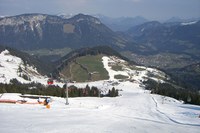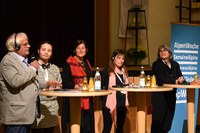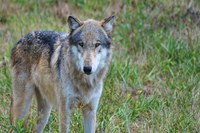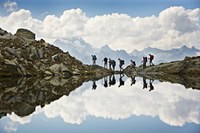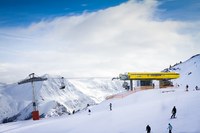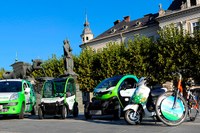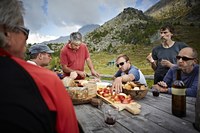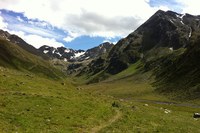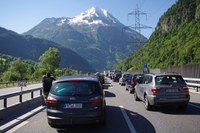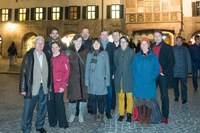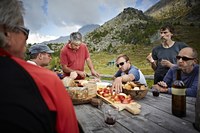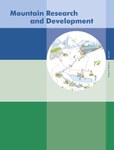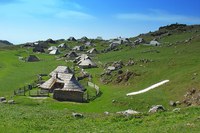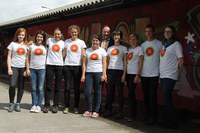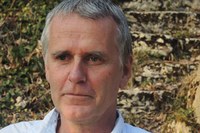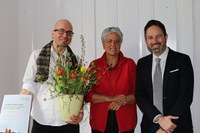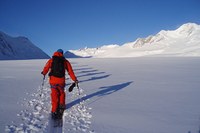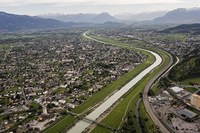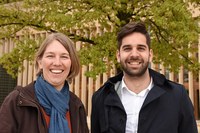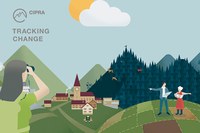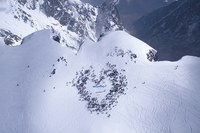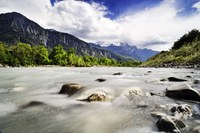Articles
The Alpine Convention declares itself in favour of the “Green Economy”
How should a sustainable economy in the Alpine region look? The Alpine conference held in Grassau, Germany, in October 2016 adopted a report on this topic: its implementation will show how well-suited it actually is. Read More…
The Alps are losing their snow
A recently published study shows that winters are ever shorter and the amount of snow is decreasing. The main reason for long winters becoming more and more a thing of the past is the earlier spring thaw. Read More…
Taking small steps together
Last week’s AlpWeek held in Grassau/DE saw the focus on people and their relations with the Alps. The topics of migration and youth participation were particular subjects of discussion. Read More…
Wolves once more in the firing line
Downgrading the protected status of the wolf, control, even wolf-free zones: these are some of the demands of the Alpine farming federations in the Alpine regions as part of the fitness check conducted on the Fauna Flora Habitat (FFH) directive. Nature conservation organisations respond. Read More…
On foot through the Alps
From June to September 2017 the “whatsalp” group of mountain enthusiasts will be crossing the Alps from east to west, documenting the changes to the Alpine regions as they go. CIPRA will be accompanying them as a project partner. Read More…
Media address expansion of winter sports
The call by CIPRA to end the constant upgrading of ski areas has found considerable support. Facts such as climate change, stagnating numbers of skiers and falling profits underline the urgency of these demands. Read More…
Oh...
…”Ah! Eh! Ih! Oh! Uh!” comes a rough voice from the loudspeaker. He said nothing for 5,300 years: but now Ötzi, the famous Man from the Ice, has found his voice again. Read More…
Point of view: A strategy for people in the Alps
The European strategy for the Alps is intended to create new relationships between Alpine regions and the surrounding areas. This however requires oversight to ensure the reconciliation of interests as well as sustainable development, says Andreas Pichler, director of CIPRA international. Read More…
The Alpine Convention in action
Urban areas are not often directly thought of in connection with the Alpine Convention - “the Alps are mountains, not cities” is the refrain. The Austrian city of Klagenfurt contradicts such views. Read More…
Of ruins, deer and people
How do migration and depopulation, spatial planning or climate change affect quality of life? The various aspects of the relationships between the Alps and the people who live, work and relax there are the focus of AlpWeek 2016, to be held from 11 to 15 October 2016 in Grassau, Germany. It is being staged by leading Alpine-wide organisations, including CIPRA. Read More…
Strange but true...
This is the story of why all mountains may soon be covered with sawdust in summer. Read More…
Rock ptarmigan may continue to nest
No ski lifts or pistes may be built on the mountain slopes of the Vallaccia Valley in Italy. This decision of the Lombardy Administrative Court now overturns the authorisation granted by the Italian Council of Ministers. Read More…
No free ride from Italy to Germany
The European Union does not want to finance the Alemagna motorway: but the Italian Veneto Region is insisting on the road link to Germany. Read More…
Joint commitment to the Alpine space
The interaction between CIPRA International and the “Alliance in the Alps” goes back to the foundation of the latter in 1997. The basis for co-operation has now been renewed at a strategy meeting. Read More…
Rendezvous of friends of the Alps
Migration and depopulation, perspectives of traditional crafts, climate change, health. These are some of the topics that will be discussed during the AlpWeek 2016. The meeting is being planned for October by leading Alpine-wide organisations, including CIPRA. Read More…
Mountain Research and Development, Vol 36, No 2, on Modernization and Sustainable Development in Mountains
Papers address modernization and sustainable development, showing that some aspects of modernization can lead to sustainability—eg improved energy use in Europe, multilocal livelihoods in Pakistan, biosphere reserves in Europe, agrotourism in Thailand, or improved governance in Nepal. Further papers deal with carbon storage in Thailand, forest composition in China, stump debarking in the Czech Republic, treelines in the Andes, and hydropower energy storage in Europe. Read More…
Global Soil Biodiversity Atlas
The JRC and the Global Soil Biodiversity Initiative (GSBI) publish the first-ever Global Soil Biodiversity Atlas that maps the soil biodiversity of the entire planet. This unique Atlas pays tribute to soil – the silent engine that keeps the planet alive – by providing a detailed analysis of soil organisms and the threats to soil biodiversity at global scale. Read More…
Democratic renewal: success and failure
People have been gathering every night in Paris since the end of March in the “Nuit debout” (Up all night) movement in order to discuss a world that is democratic, environmentally friendly and socially more just. What French cities dream of is already being tested for real in Alpine villages. Read More…
“Glamping” in the Slovenian Alps: a critical view
A new “Eco Resort” in Slovenia promises luxury farmhouse holidays. Just a few kilometres away the genuine Alpine huts of the “Velika Planina” stand ready for guests. Read More…
Young ideas for a green economy
This year’s Youth Parliament of the Alpine Convention, held in the Italian town of Bassano del Grappa, focussed exclusively on the topic of “Green Economy”. The “Youth Alpine Express” also stopped off there. Read More…
Point of view: Switzerland needs help with its climate policy
Switzerland was formerly a leading light in environmental policy. Today, sadly, it does not even have a plan for implementing the goals of the Paris climate agreement, says Hans Weber, executive director of CIPRA Switzerland. Read More…
Tracking change with CIPRA
Twenty-five years have passed since the Alpine Convention was established. In its Annual Report, CIPRA International focuses on the role the international agreement plays for panalpine cooperation today and the role it could play in the future. There is also an internal change to report – in August 2016, Andreas Pichler will be taking the helm of the Liechtenstein-based NGO. Read More…
Award-winning tourism
Tourism too has its success stories. Innovative projects in the Alps are drawing attention. A national park in Germany now shows that sustainable tourism can also bring economic benefits. Read More…
Chemicals in the Alps– unwanted souvenirs
Not only particulates are causing problems for people and animals: chemicals too are accumulating in the Alps. As one of the causes the outdoors industry is only gradually moving to remedy matters. Read More…
One river, numerous desires: disagreements about the Alpine Rhine
A current bone of contention between different interest groups is the priority to be given to the various uses made of the Alpine Rhine: as a farming area, as a habitat for the little ringed plover and the German tamarisk, or as a drinking water reservoir. SPARE, a new European Union project for the Alpine region, will offer assistance for the holistic management of watercourses. Read More…
Change is in the air
A change of executive director at CIPRA International and at CIPRA Austria, and a new president for CIPRA Switzerland: the new faces shaping the future of CIPRA. Read More…
CIPRA and the Alpine Convention: a fruitful co-operation
An architectural competition, a climate conference, activities with young people: CIPRA and the Alpine Convention have a lot in common, as the current annual report of CIPRA International makes clear. Read More…
Point of view: 25 years of the Alpine Convention are not enough
While we celebrate 25 years of the Alpine Convention, we still bemoan the slow pace of its implementation. For its objectives to be achieved, believes Katharina Conradin, President of CIPRA International, we have to repeatedly demand their realisation. Read More…
Better protection for natural spaces
Resistance is growing across the Alps against construction activities in pristine or largely unspoilt areas. CIPRA is making an appeal for integrative spatial planning to the Alpine states meeting this week in Murnau, Germany. Read More…
SPARE – Alpine rivers as society’s lifelines
What is the state of the Alpine rivers? How can we bring those responsible and other interested parties to committing themselves to holistic river management? The SPARE project strives to answer these and other questions. CIPRA and eight additional partners have launched the three-year project at a two-day meeting in Vienna in early February 2016. Read More…

